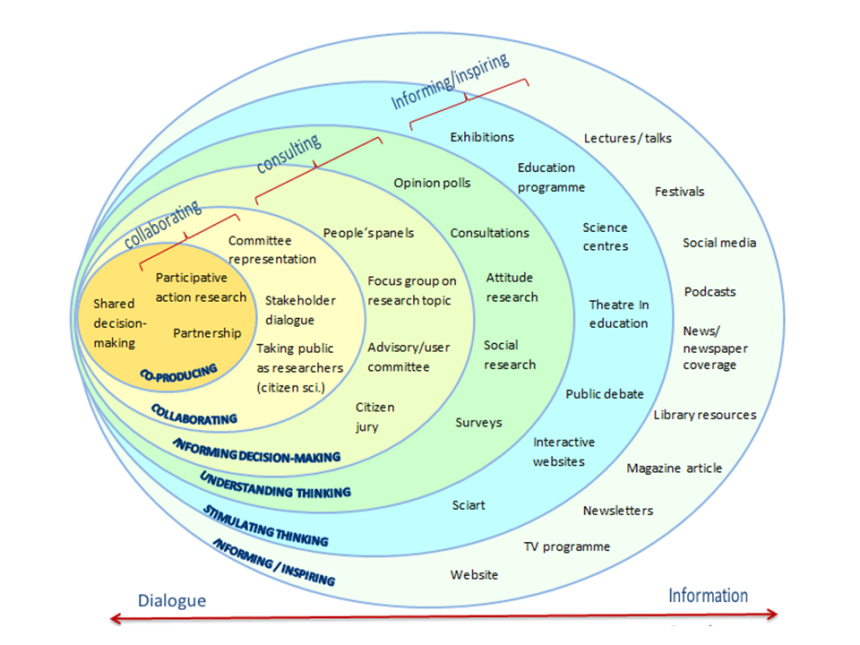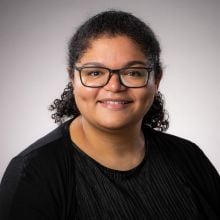
PCER Fund
Key info
| Application deadline | 12 noon, 3 November 2025 |
| Funding available | Up to £6,000 per project |
| Total fund | £60,000 |
There is currently one application deadline confirmed for the 2025/26 academic year, in Michaelmas term. The PCER team is exploring possibilities of a further deadline in Trinity term 2026 and will provide an update on this if it is confirmed in 2026.
What is the PCER Fund?
The Public and Community Engagement with Research (PCER) Fund allows researchers and public engagement facilitators to apply for funding to support purposeful and responsible public and community engagement with research activities.
Who can apply?
Any researcher or public engagement professional at the University of Oxford from any discipline or research area can apply as Principal Investigator (PI). PIs are accountable for the project.
As PI, you can submit applications with co-applicants. Co-applicants may be other staff members (e.g., researchers, DPhil students, teaching staff, public engagement professionals, museum staff) or external partners (e.g. representatives from patient and community groups, teachers, etc).
Both newcomers and those experienced in public engagement with research are encouraged to apply.
Eligibility requirements:
- A University cost centre is required to host an award. College-based activities are possible, but funds must be managed through a faculty or department.
- At least one applicant (either the PI or a co-applicant) must be a researcher at the University of Oxford.
- DPhils are welcome to apply but will need the support of their supervisor/PI. DPhil applicants should ensure that their supervisor/PI supports the project, agrees to hold the budget in the event of funds being awarded, and include their supervisor as a Co-Applicant in the application in IRAMS.
- There’s a deadline for spending the funds so you’ll need to make sure your project can be completed by 30 June 2026.
- Your project must be engaging the public and/or communities with your research. Before applying please consider the information in the ‘About the fund’ and ‘Preparing your application’ sections to determine if your project is right for the PCER Fund.
How much funding is available?
As an applicant you can apply for up to £6,000 to support your project. There is a total of £60,000 available for the 2025/2026 academic year.
Funds must be spent before the end of June in the financial year they are received.
What can funds be used for?
All funds requested should be spent on the development, delivery and evaluation of your project and justified in the budget section of your application.
The kinds of costs that can be applied for may include (but are not limited to):
- Equipment and materials costs
- Reasonable travel costs in line with the University’s travel policy
- Venue and catering costs (e.g. for engagement workshops)
- Recognising and rewarding community contributors for their time and expenses
- Promoting or advertising engagement opportunities
- Staff time and/or salaries
Questions?
If you have any questions about the PCER Fund, please contact Faye Shelbourne ([email protected]) in the Public and Community Engagement with Research Team in Research Services.
For support in planning your project and preparing your application, we suggest speaking to the Public Engagement Lead in your division:
- Humanities: Karen Houghton(Head of Impact)
- Mathematical, Physical and Life Sciences: Dr Michaela Livingstone-Banks (Head of Public and Community Engagement with Research)
- Medical Sciences: Naomi Gibson (Public and Policy Engagement Facilitator)
- Social Sciences: Aileen Marshall-Brown (Head of Engagement)
- Gardens, Libraries and Museums (GLAM): Dr Harriet Warburton (Head of Research and Impact Management)
What are the aims of the PCER Fund?
The PCER Fund supports researchers to improve their research through public and community engagement activities. We believe that engaged research is better research, because incorporating diverse perspectives improves ideas, makes findings more relevant and maximises the positive differences that research can make to the world.
The fund plays a key role in the University’s Public and Community Engagement with Research strategy, and its vision for a university where purposeful and responsible engagement with communities and the public is integral to our research, driving collaboration and creating positive change. As well as financial support, the fund provides evaluation support to awardees carrying out engagement activities.
The PCER Fund supports projects from all disciplines, and aims to:
- Encourage and support public and community engagement projects that:
- expand upon established ideas; or
- experiment with innovative methodologies and novel approaches, and enhance engagement practices; and/or
- develop external partnerships for future engagement opportunities.
- Engage a diverse range of people with Oxford’s research, including under-engaged groups, bridging the gap between research and the public and communities.
- Develop researchers’ skills in public and community engagement with research.
- Fund projects with the potential to make a difference to members of the public and communities, researchers, and/or their research.
What won't we fund?
Projects that aim to target policy makers or engage business and industry are not eligible for the PCER Fund and should apply to the University’s Knowledge Exchange Seed Fund or one of the OPEN policy engagement funding schemes.
Similarly, projects that aim to reach undergraduate students, or where the primary purpose is to increase student applications to the University are not eligible for the fund.
Previously funded projects
To read about projects who received funding from the PCER Fund in 2024/25 academic year, and earlier years when the fund was the PER Seed Fund, browse our project library here.
Is your project right for this fund?
Please ensure you meet eligibility criteria before making an application (see ‘Overview’ section).
To assess whether your project is right for this fund, it can be helpful to consider the following:
1 - Purpose & Difference
Your project should have a clear purpose that is responding to an identified need within the public and/or community you are working with. This might include building on work that’s already underway, starting something completely new, or even developing a relationship for future engagement work. The project should be clearly related to your research and have clear intended or desired objectives.
Ideally, projects should be mutually beneficial to all involved, including members of the public/ a community, researchers or the research itself.
When you think about the difference(s) your project will make, it may be helpful to consider whether it’s a difference in knowledge/information, skills/capacity, or behaviour/attitudes.
Examples of what difference(s) a project could make to different groups are set out below:
Differences made to the public and community(s)
Type of difference – Knowledge/information
Increase awareness of a research topic or outputs
Type of difference – Skills/capacity
Enable audiences to explore a research topic that is new to them
Type of difference – Behaviour/attitudes
Stimulate new interests or increase self-confidence
Differences made to Researchers
Type of difference – Knowledge/information
Increase awareness of common public attitudes towards their research topic
Type of difference – Skills/capacity
Enable researchers to tailor their approach in the context of common public attitudes towards their research topic
Type of difference – Behaviour/attitudes
Increase fulfilment as researchers feel more connected and responsive to public
2. Methods & audiences
Alongside the purpose of your project and the differences you hope to make, thinking about the types of activities your project will be undertaking and who you will be working with will help you decide if your project is right for this fund.
The fund aims to support projects engaging a diverse range of people, including (but not limited to) groups who may have been under-engaged in the past, through responsible, purposeful methods. These might be new, innovative methodologies or something more tried and tested. The methods you use must be appropriate and relevant to the groups you are working with and the differences you are aiming to make.
Some examples of the kinds of activities you could do to make those differences are:
- Co-creation of research questions with relevant communities
- Consultation or interviews with public or community contributors to inform your research
- Production of a podcast series or animations to share your research
- Bringing together diverse stakeholders to develop innovative methodologies or tools that address societal challenges
Engagement with research activities
The Public Engagement ‘onion’ developed by Wellcome is a helpful visualisation of the types of activity that can be defined as public engagement with research. It also represents which activities lend themselves to ‘deeper’ levels of engagement, i.e., where a more rich, two-way interaction can take place; shared decision making at one end and broadcast activities at the other.
 Engagement Onion
Engagement OnionYou can read a transcript of this image here: The Public Engagement Onion — Mathematical, Physical and Life Sciences Division
Participatory Research
While we fund a whole range of engaged research activities, we also strongly encourage applications from participatory research projects.
Vaughn and Jacquez (2020) developed a helpful definition that offers a starting point for reflection, highlighting that in participatory research, knowledge is co-created in collaboration with those with direct, lived- and living- experience of the topic in focus:
“Participatory research (PR) encompasses research designs, methods, and frameworks that use systematic inquiry in direct collaboration with those affected by an issue being studied for the purpose of action or change. PR engages those who are not necessarily trained in research but belong to or represent the interests of the people who are the focus of the research.” (p.1)
You can read more on our website Participatory Research Oxford
Community Engagement
The term ‘community’ has very different meanings for different people. We understand it as distinct from the general ‘public’. Whilst we welcome applications from projects engaging with the general public, engaging with relevant, more specific communities can increase the potential of your project to make a bigger difference to the groups you are working with.
A community can be any group of people that is connected by place (e.g., a shared geographical location such as people who live in the same town suburb or postcode region), by practice (e.g., a shared profession or activity such as teachers, entrepreneurs), by identity (e.g., gender, ethnicity) and/or experience (e.g. parents, migrants, experience of a particular health condition), or an intersection of more than one of the above (e.g. people in a particular location, with a particular identity who have specific life circumstances). Which community or communities you decide to work with should be influenced by, and in turn influence, your research.
What is distinct about engaging with communities is the purpose and the methods or practices used to do engaged research. Community engagement should be oriented around understanding a community’s needs and improving their circumstances in a co-constructed, non-paternalistic way. As such, community engagement should be built around inclusive, participatory practices and be oriented around consulting and collaborating, rather than informing.
Often, community engaged research can be a catalyst for further activity or social action:
"[Community engagement] often involves partnerships and coalitions that help mobilize resources and influence systems, change relationships among partners, and serve as catalysts for changing policies, programs, and practices."
- Centers for Disease Control and Prevention. Principles of community engagement (1st ed.). Atlanta (GA): CDC/ATSDR Committee on Community Engagement; 1997
What support is available?
When preparing your applicaton, the following resources may be helpful:
- FAQs and resources for planning public engagement with research activities can be found on the PCER Fund Padlet.
- Responsible Engagement and Knowledge Exchange Framework
- Participatory Research Oxford resources
For support in planning your project and preparing your application, we suggest speaking to the Public Engagement Lead in your division:
- Humanities: Karen Houghton, Head of Impact
- Mathematical, Physical and Life Sciences: Dr Michaela Livingstone-Banks (Head of Public and Community Engagement with Research)
- Medical Sciences: Naomi Gibson (Public and Policy Engagement Facilitator)
- Social Sciences: Aileen Marshall-Brown (Head of Engagement)
- Gardens, Libraries and Museums (GLAM): Dr Harriet Warburton (Head of Research and Impact Management)
How do I apply?
1. Download and complete the Case for Support template.
2. Save the completed form as a PDF.
3. Use the University’s Internal Research Award Management System (IRAMS) to complete the online form with further details of your project and budget breakdown.
- Applicants should only fill in budget details in IRAMS for the first financial year (Year 1). More budget lines will appear as you enter budget information.
4. Upload the PDF version of your completed case for support in IRAMS and submit your application by 12 noon, 3 November 2025
Your application will be automatically submitted to your department or faculty. We may contact you during the decision-making process to discuss aspects of your application.
What are the assessment criteria?
Panels reviewing applications will consider whether a project:
1. Is meeting a need that is important to the groups involved, and is connected to applicant’s broader research (Q3 of application form)
Reviewers will consider questions like:
- Why is this project needed?
- Is the project addressing an important issue for the group(s) involved?
- Is this connected to the applicant’s broader research?
2. Could make a positive difference to the engaged group(s), the research and/or researchers (Q5, 6, 7)
Reviewers will consider questions like:
- Is the project activity likely to improve the research?
- Will it make a positive difference for the group(s) involved, like learning new things, getting better at something, or changing how they think or act?
- Could this project help researchers gain more knowledge or skills?
3. Uses methods that are relevant and appropriate to the difference(s) the project aims to make and the engaged group(s) (Q8, 9)
Reviewers will consider questions like:
- Do the planned activities seem suitable for the group(s) involved?
- Is it clear how the activities could lead to the difference(s) the project aims to make?
- Do activities seem well planned, and achievable in the timeframe?
- Are engaged groups consulted throughout the project?
- Does the choice of engaged group(s) make sense to the project's difference(s) the project aims to make?
4. Is engaging responsibly with the group(s) involved (Q8, 9, 10)
Reviewers will consider questions like:
- Where applicable, does the applicant already know the group(s) involved? Have they talked to them to make sure they support the activity?
- Will applicants work ethically with group(s)? For example, will they explain what will happen with the information or data given by participants? Are they aware of any risks to participants and handling these carefully?
- Will the group(s) be paid or rewarded for their time, contributions, and expenses?
- Are the project activities inclusive and accessible, from recruitment to communication with the group(s)?
- Does the applicant consider equity and diversity?
- Does the applicant show respect for the group(s)’ specific context, culture, and power dynamics?
5. Will be able to know if they have made the difference(s) they aim to (Q11)
Reviewers will consider questions like:
- Do applicants have a plan to find out if they have made the difference(s) they aim to?
- Will they involve engaged group(s) in any evaluation of the activities and/or difference(s) made?
6. Could make a long-term difference on the engaged group(s) and/or research (Q12)
Reviewers will consider questions like:
- Could the project have a long-term effect on the engaged group(s)? Is there a plan to stay in touch with them about this work?
- Are there any materials from the activities, like resources or videos, that can be used in the future?
- Is there a chance the activities could continue after the funding ends?
7. Is achieving good value for money (Q13)
How are decisions made?
Applications will be assessed against the criteria by members of two separate groups of reviewers:
- Public & Community (P&C) Panel: community members external to the University who have experience engaging with research (more details about this panel and its activity can be found in the PCER Fund call).
- Internal reviewers: public engagement experts across the University, including divisional PCER leads, Public Engagement Facilitators and researchers.
Following the review process, applications will be discussed at a recommendations panel meeting. If there are 25 or fewer applications, the panel will recommend specific projects to fund. If there more than 25 applications, the panel will identify projects that it deems to be fundable, and they will be entered into a lottery that will be managed by the PCER team.
What happens next?
We will aim to communicate funding decisions by email five weeks after the application deadline. All applications will receive detailed feedback from our review panels a couple of weeks later.
We aim to share budget codes with successful applicants within 6-8 weeks of announcing funding decisions. However, we cannot guarantee budget code timeframes as this process is not managed by the PCER Team. If there are any delays in getting your budget codes to you and your project is likely to suffer as a result, you may need to speak to your department about underwriting costs.
If you have any questions about this fund, please contact Faye Shelbourne ([email protected]) in the Public and Community Engagement with Research Team in Research Services.
For support in planning your project and preparing your application, we suggest speaking to the Public Engagement Lead in your division:
- Humanities: Karen Houghton (Head of Impact)
- Mathematical, Physical and Life Sciences: Dr Michaela Livingstone-Banks (Head of Public and Community Engagement with Research)
- Medical Sciences: Naomi Gibson (Public and Policy Engagement Facilitator)
- Social Sciences: Aileen Marshall-Brown (Head of Engagement)
- Gardens, Libraries and Museums (GLAM): Dr Harriet Warburton (Head of Research and Impact Management)
We’re delighted to share details of PCER Fund awardees from the Michaelmas Term 2025 application window. We received 32 applications and awarded funding to 9 projects. The proposals covered a wide range of public and community engagement with research activities, representing multiple divisions and disciplines. Planned projects will take place in Oxfordshire, across the UK, and internationally, demonstrating the diversity and impact of engagement work across the University.
We were pleased to receive applications from researchers and public engagement professionals at various stages of their careers, reflecting a broad spectrum of experience and perspectives.
Many thanks to everyone who applied and to our reviewers – both internal to the University and members of our external Public & Community Panel– who assessed applications to help decide the final projects to be funded.
You can read summaries of our latest funded projects below.
To read about previously funded projects you can browse our list here and explore projects by Division dating back to the 2021/2 academic year.
Michaelmas Term 2025: Funded projects
 | Let’s Talk About: Surveillance –‘Tracking Outbreaks and Resistance’PI: Sean EliasDivision: Medical SciencesDepartment: Pandemic Sciences Institute, Nuffield Department of Medicine |
‘Let’s Talk About’ is a novel format PCER event conceived as a collaboration between the Pandemic Sciences Institute and History of Science Museum. On 12th June 2025 we ran a pilot event focused on the topic of Stigma and infectious disease. Adopting an interactive format, the event saw our audience assigned to small groups that rotated around 5 resident experts, a blend of early careers researchers and healthcare practitioners. At each “station”, the groups’ conversations – guided by the experts - explored different experiences and perspectives on illness and stigma. Each expert had brought an object with them that prompted questions and discussions. This scientific “speed dating” was followed by a more traditional panel discussion and finished off with free time for relaxed one-on-one questions. The format was designed to encourage and empower audience participation and freedom to express their opinions in a comfortable setting. In parallel the format was designed for our experts to explore novel ways to engage audiences.
Our proposal is to repeat and expand on this pilot event with a new subject, ‘surveillance’, building on successes and audience/participant feedback from the pilot. For our second event in the series we also propose holding parallel events, in both our original location in Oxford as well as at a second location in Swindon as part of the Festival of Tomorrow. We want to identify how different audiences embrace our format, engage with our experts and compare and contrast the directions that conversations take.
 | Tasting the Past: A Sensory Exploration of Tea in Museum CollectionsPI: Anke HeinDivision: Social SciencesDepartment: School of Archaeology |
Smell and taste have direct neurological links to emotions and memories (Ehrich et al. 2023, Breslin 2013). As such, in a museum context, smell-based activities can evoke powerful connections to the past. This project expands upon methods in the “The Olfactory Storytelling Toolkit: A “How-to” Guide for Working with Smells in the Museum and Heritage Institutions” (Ehrich et al. 2023). It explores the role of taste as a tool for storytelling and research in museums. A collaborative team from the School of Archaeology and Crossmodal Research Laboratory (Department of Experimental Psychology) will work with the Ashmolean Museum, GLAM Outreach professionals, WeaveYard community curatorial platform, and Oxford ceramic artist, Jynsym Ong to deliver a taste-based workshop to museum visitors. The workshop invites participants to drink tea from replicas of historic cups, attend a guided tour with object handling, and discover the history of tea. Feedback from the tea-tasting session directly informs ongoing archaeological PhD research into the sensory properties of historic ceramic vessels. Participants will be acknowledged in publications. We provide a model for sensory activities and invite visitors to co-create knowledge and correct/re-interpret curatorial understandings of museum collections; benefiting museum visitors and staff, artists and researchers.
 | Nuggets of Research: Co-designing a website to bridge the translation gap in youth mental health researchPI: Nina Higson-SweeneyDivision: Medical SciencesDepartment: Department of Experimental Psychology |
This project aims to collaborate with key stakeholders to co-design a website and/or social media platforms that disseminates the latest research in youth mental health in a condensed, jargon-free format to the general public. We will host co-design workshops with parents, teachers, clinicians, and researchers to identify what the website/social media will look like, how it will function, and how information regarding new research is uploaded and shared. We will then engage in an iterative process of design and feedback, before launching the website/social media and evaluating its reach and reception.
As one of the main issues in translating research into practice tends to be accessibility (e.g., paywalls) and awareness of information, the co-design element of this project should ensure that the resources developed meet the needs of stakeholders. Hopefully, this increased access to evidence-based research will result in greater knowledge and awareness of youth mental health, and contribute towards reducing the gap between evidence and implementation.
The funding from PCER will be used to reimburse stakeholders and a casual research assistant, and pay for software fees and advertising costs. In the long-term, this will be an international resource that is mutually beneficial for researchers and the general public.
Sounds of Tolerance: Co-Creating Music Inspired by Immunological Research and the Lived Experience of IBDPI: Rachel HindmarshDivision: Medical SciencesDepartment: Nuffield Department of Medicine |
This project uses the co-creation and performance of music as a creative medium for engaging inflammatory bowel disease patients with immunological tolerance research.
Tolerance mechanisms such as regulatory T-cells play a key role in preventing autoimmune disease by maintaining the body’s tolerance to beneficial bacteria. Recent studies by the Translational Gastroenterology and Liver Unit (TGLU), led by project co-lead Paul Klenerman, uncover why the body can lose this tolerance – leading to IBD - and how it can be recovered. ‘Tolerance’ as a metaphor also prompts more holistic discussions about coping with chronic illness and resulting stigma.
Building on our team’s creative, interdisciplinary, and participatory approach to engagement in Thanks for the Memories (T4TM), this project will run inclusive workshops supporting IBD patients to compose original music inspired by immunological and metaphorical dimensions of ‘tolerance’ and to inform a new work by co-lead composer Zakiya Leeming. Patients will collaborate with musicians to bring their pieces to life in a public performance at the Old Fire Station.
The project will support IBD patients to better understand their conditions, share their lived experiences to shape impactful tolerance research, and promote public awareness of the challenges of living with chronic illness.
Workforce Voices: the art of workforce sustainability
PI: Eleanor Hoverd
Division: Medical Sciences
Department: Nuffield Department of Primary Health Care Sciences
This arts-based project will ignite conversation and connection between NHS staff and patients in general practice, in a highly deprived area in the Northeast of England. By co-designing a locally rooted vision and set of values for workforce sustainability, the project will give voice to those often unheard in national workforce debates. This includes a critical focus on the gatekeeper experiences of receptionists and administrative teams, alongside patients in under-served communities, acknowledging the high burden and pivotal role they play in managing patient access and flow.
The process will strengthen trust and understanding between researchers, frontline staff, and patients, creating a shared language around what it means to build and sustain a flourishing NHS workforce. Visual and creative methods including graphic illustration, staff and researcher artwork, photography, and a patient-staff “values tree” will make complex ideas accessible and emotionally resonant. The co-created artwork will represent ‘common ground’ for the Workforce Voices research partnership (an academic partnership between Oxford, Newcastle, Northumbria, York and Birmingham) to share as a representation of dialogues, empathy and collective insight. It can be used to facilitate future conversations around workforce sustainability. The partnership broadly aims to undertake research to find solutions for improving workforce sustainability in the NHS. The tangible outputs - the co-created artwork, locally rooted vision and co-produced vision and values - will underpin our wider research and contribute to fostering a culture of collaboration between general practices and their patients. They will also contribute to our future dissemination and engagement activities (for example, as part of public or institutional displays or events), ensuring the lived experiences of staff and patients remain central to policy and practice discussions.
 | Exploring visual depiction of Autistic Young People’s Character Strengths use in everyday life: A Zine-Making Workshop studyPI: Jiedi LeiDivision: Medical SciencesDepartment: Department of Experimental Psychology |
Autistic young people (AYP) encounter deficit-focused autism narratives that can negatively impact their self-esteem and well-being. Media portrayals of autism often perpetuate unhelpful stereotypes of what “autistic strengths” should look like, and lack nuance. Our group’s research focuses on helping AYP to identify their strengths and abilities through exploring Character Strengths (CS): 24 universal traits, such as Curiosity, Creativity, and Bravery, that motivate us to take action in everyday life.
We will run workshops with AYP (age 12-21) to create Zines showcasing their unique CS. Zines are do-it-yourself publications giving voices to marginalized communities by sharing stories contrary to mainstream ideology. AYP in the workshop will be invited to: 1) Explore unhelpful stereotypes of autistic strengths depicted in mass media; 2) Learn about CS and compile examples of strengths in action; 3) Create individual “Zine” that illustrates personal stories of everyday CS use that can be curated into a group Zine to shift public perception of what meaningful strengths’ use in autistic young people’s lives might look like. Final Zine output will contribute to Zines on Disability Justice by Wellcome Collection, creating a lasting change through shaping public knowledge by empowering AYP to express their CS use in everyday life.
 | Developing State-School Students’ Critical GenAI Literacy through Global Englishes and the Korean WavePI: Alfred LoDivision: HumanitiesDepartment: Faculty of Asian and Middle Eastern Studies |
This project explores how artificial intelligence and contemporary culture can make English education more inclusive and engaging in UK state schools. Generative AI (GenAI) tools such as ChatGPT are increasingly part of young people’s everyday lives, yet they often reinforce narrow ideas of what counts as ‘good English’. In partnership with the Oxford English Dictionary (OED), the project introduces a creative workshop model where students examine how English evolves globally and digitally. The recent rise of the Korean Wave in the UK provides an ideal entry point for young people to explore global English diversity. K-pop, K-dramas, and Korean social media trends have become major sources of language creativity, with words such as oppa, dalgona, and tteokbokki now recognised in the OED.
By drawing on this familiar popular culture, students will see how English grows through global exchange, and how GenAI interprets and sometimes distorts these influences. The project helps students learn not only how to use GenAI responsibly, but also how to question it critically. It aims to inspire curiosity about global English diversity and encourage positive attitudes towards modern languages. The project will culminate in a free, replicable classroom toolkit for teachers to integrate AI and dictionary resources in inclusive and motivating ways.
Global Encounters, colonial images of India by Eugene Clutterbuck Impey - a springboard to interpreting through multiple perspectives in school teaching engagement at the Ashmolean Museum
PI: Melanie Rowntree
Division: Gardens, Libraries & Museums
Department: Ashmolean Museum
The exhibition Colonial Views of India: Photographs by Eugene Clutterbuck Impey, curated by Professor Mallica Kumbera Landrus and based on her research, will open at the Ashmolean Museum in April 2026, accompanied by a publication of the same title. Objects and narratives from the exhibition and publication will act as a springboard to redevelop the Ashmolean’s Global Encounters secondary school session, piloting new ways to include multiple voices in the Museum’s schools offer by centring perspectives linked to colonised histories.
In partnership with Oxford’s BeUniq programme, workshops in Bradford schools will support pupils from Bangladeshi and Pakistani communities, empowering young people from historically under-represented communities to reinterpret colonial collections through their own perspectives. Oxford University student interns, chosen for their subject expertise, will collaborate with the Ashmolean’s Schools and University Engagement Team to reimagine the Global Encounters session, researching and developing creative interpretive responses to selected objects through participatory research with community knowledge keepers. This project aims to challenge colonial framings and model a decolonial approach for future museum education practice, with the resulting teaching resources and their evaluation establishing a framework to guide and share decolonial pedagogy across the sector.
Democratising global health research on a local level: Empowering a youth advisory group to co-create a community driven research agenda
PI: Elke Wynberg
Division: Medical Sciences
Department: Mahidol Oxford Tropical Medicine Research Unit (MORU)
Global health research has often been conducted on rather than with communities in low-resource settings, limiting shared decision-making and reinforcing inequities in representation, trust, and scientific literacy. Research agendas are frequently determined by Global North institutions and funders. This top-down approach not only raises ethical concerns but also contributes to public disinterest and distrust in science, driving communities toward unregulated and unreliable health information sources such as social media.
To address these challenges, community engagement initiatives—particularly youth advisory groups—have shown promise in strengthening dialogue between researchers and local populations. Since 2021, the Mahidol Oxford Tropical Medicine Research Unit (MORU) in Bangkok has collaborated with local student partners in north-eastern Cambodia to establish the Youth Advisory Group on Health and Research Engagement (YAGHRE). This group works to promote community participation in health research procedures, education, and communication.
Building on encouraging initial outcomes, this project will expand YAGHRE’s role in Siem Pang district with two objectives: (1) co-developing a dynamic, community-informed research agenda that highlights local health priorities, and (2) mapping health information sources to guide effective health communication. These activities will strengthen YAGHRE’s capacity as agents of change and enhance equitable, community-led health research.
